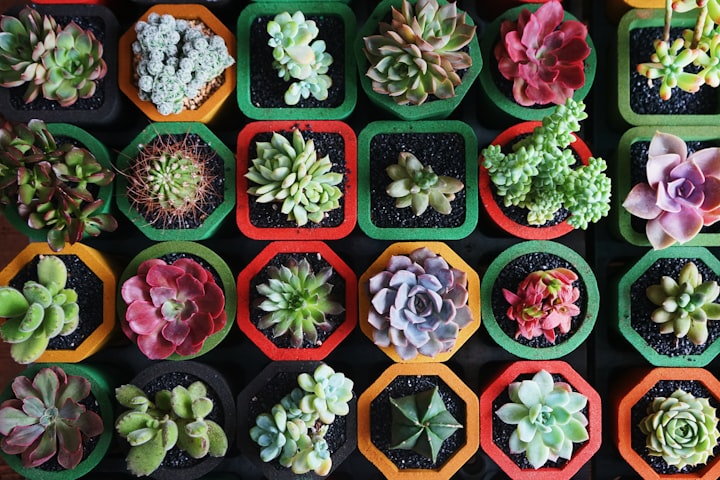Expert Tips for Successful Succulent Care
Want your succulents to thrive? Check out these expert care tips!
Succulents are a popular choice for indoor and outdoor gardening, thanks to their unique and exciting appearance. However, caring for succulents can be tricky for beginners. In this article, we will discuss expert tips for successful succulent care, including choosing the right succulents, watering techniques, soil and fertilizer recommendations, light requirements, propagation techniques, common pests and diseases, repotting, and answers to common questions about succulent care.
Understanding Succulents:
Succulents are plants that store water in their leaves, stems, or roots. This allows them to survive in arid or semi-arid environments. There are over 60 plant families that include succulents, such as cacti, aloe, and agave. Common characteristics of succulents include thick and fleshy leaves or stems, spines or thorns, and a slow growth rate.
Choosing the Right Succulents:
When selecting succulents, it is important to consider factors such as the amount of space available, the amount of light they will receive, and your level of experience with gardening. Some of the best types of succulents for beginners include Echeveria, Haworthia, and Sedum. These plants are low-maintenance and come in a variety of colors and textures.
Watering Succulents:
Overwatering is one of the most common mistakes made by succulent owners. It is important to allow the soil to dry out completely before watering again. Signs of overwatering include mushy or discolored leaves, while signs of underwatering include shriveled or dry leaves. The best practice for watering succulents is to use the "soak and dry" method, which involves thoroughly saturating the soil and allowing it to dry out completely before watering again.
Soil and Fertilizer:
Succulents require well-draining soil to prevent root rot. The best soil mix for succulents includes a combination of coarse sand, perlite, and potting soil. Fertilizers should be applied sparingly, as succulents do not require a lot of nutrients. A balanced fertilizer with equal parts nitrogen, phosphorus, and potassium is recommended.
Light Requirements:
Succulents require bright, indirect sunlight for at least six hours a day. Placing succulents near a south-facing window is ideal. It is important to protect succulents from direct sunlight, as this can cause damage to the leaves.
Propagation Techniques:
Propagation is the process of creating new plants from existing ones. There are several methods of propagation for succulents, including leaf cuttings, stem cuttings, and offsets. Successful propagation requires proper care and attention to detail
Common Pests and Diseases
Succulents are hardy plants, but they can still fall victim to pests and diseases. The most common pests that affect succulents include mealybugs, spider mites, scale insects, and aphids. These pests feed on the sap of the plant, causing stunted growth, yellowing leaves, and even death if left untreated.
Symptoms of succulent diseases can include black spots, rotting stems or leaves, and powdery mildew. These diseases can be caused by overwatering, poor soil drainage, or fungal infections. It is important to catch these issues early and take action to prevent their spread.
To prevent pests and diseases, it is important to practice good succulent care. Avoid overwatering and make sure your succulents have proper soil drainage. Keep a close eye on your plants for any signs of pests or disease, and take action immediately if you notice any issues.
Repotting Succulents
Succulents can outgrow their containers over time, making it necessary to report them. Signs that your succulent needs to be repotted include roots growing out of the drainage holes, soil drying out too quickly, and the plant becoming too large for its container.
When repotting your succulent, it is important to choose a container that is slightly larger than its current one. Use a well-draining soil mix and be careful not to damage the roots. Water your succulent lightly after repotting and wait a few days before resuming normal watering.
Frequently Asked Questions (FAQs)
Here are some common questions and answers about succulent care:
Q: How often should I water my succulent?
A: Succulents only need to be watered when the soil is completely dry. This can vary based on factors such as the size of the pot, the type of succulent, and the climate.
Q: Can I use regular potting soil for succulents?
A: No, regular potting soil is too dense and does not provide adequate drainage for succulents. Use a well-draining soil mix specifically formulated for succulents.
Q: Can I grow succulents indoors?
A: Yes. Many succulents can be grown indoors as long as they receive adequate sunlight and are not overwatered.
Conclusion
Succulent care can seem overwhelming at first, but with a little bit of knowledge and practice, it can be a rewarding and enjoyable hobby. Remember to choose suitable succulents for your environment, provide proper watering and soil care, and keep a close eye out for pests and diseases. With these expert tips, you can ensure your succulents thrive and bring a touch of natural beauty to your home.
"Want to give your succulents some love? 🌵💚 Check out our experts' tips for successful succulent care! #SucculentCareTips"
About the Creator
goddy igbinosa
I am an affiliate marketer and Investor, website designer.







Comments
There are no comments for this story
Be the first to respond and start the conversation.